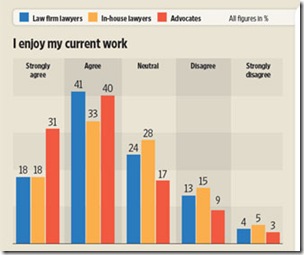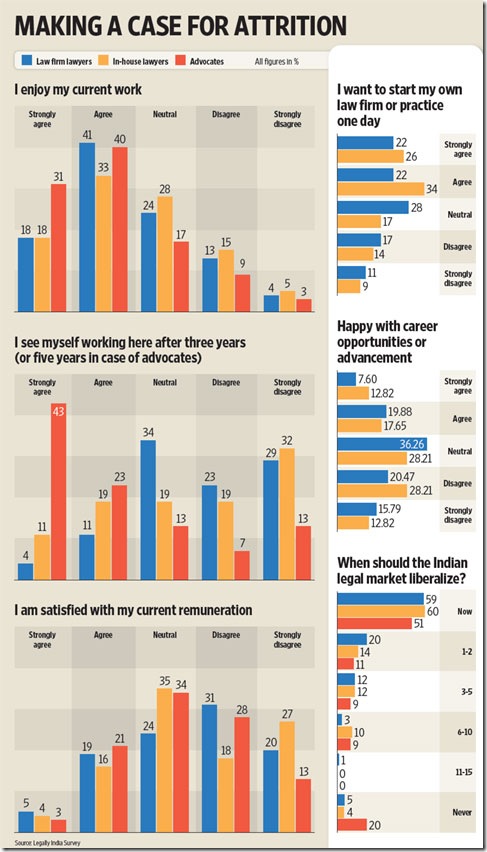
In a survey of 536 lawyers conducted by Legally India, only a small minority see themselves staying in their current jobs. Only 15% of the law firm lawyers said they could see themselves working in the same firms three years later, and more than half couldn’t. The statistic was similar for in-house company lawyers.
Furthermore, 44% of those working in law firms said they wanted to start their own law firms or practices, reflecting a trend that has showed no sign of slowing for the past several years in the Indian legal market, where almost every week there is a new start-up.
Despite the relative scarcity of start-up practices begun by in-house lawyers, 60% of the lawyers working in corporate departments also harbour entrepreneurial ambitions.
It is counterintuitive then that most Indian lawyers are fairly happy with where they work. About 59% of those working in law firms either agreed or strongly agreed that they enjoyed their current jobs. Among in-house lawyers, 51% were positive about their current roles.
The most joyous are the lawyers working in the courts, 71% of whom said they enjoyed their daily cut-and-thrust.
Why?
The lack of a good work-life balance, often seen as the bane of a corporate lawyer’s job, is an issue for 31% of the law firm lawyers. That figure increases significantly at large corporate law firms, where a lack of a work-life balance is the main cause of dissatisfaction.
“Stop giving the clients the right to call us at insane hours,” requests one corporate lawyer.
Indeed, it is telling that among in-house lawyers, who are generally the ones who call the law firm lawyers at “insane hours”, only 15% complain about their work-life balance, and 60% are happy about their hours.
The lack of perceived opportunities could be the crux to why lawyers feel the need to move on so often. Only 27% of the lawyers are happy about the careers and the advancement opportunities offered by their law firms; this statistic rises just slightly to 30% for lawyers at companies.
The single largest complaint among law firm lawyers is the lack of professionalism that they perceive in their workplaces. More than two-thirds of the law firm lawyers said they wished their workplaces were run more professionally; this was the most common suggestion given by respondents on what they would change about their firm. “Partisan family-oriented management,” is how one respondent described his workplace. Several called for greater transparency in their offices.

Pay was less often directly cited as a problem by lawyers in law firms and companies, but 51% of the lawyers in law firms said they were not satisfied with their remunerations. In comparison, only 40% of the in-house lawyers, despite generally earning lower salaries than their law firm counterparts, complained about their remunerations.
Perhaps most unequivocal were the litigating advocates, particularly juniors—27% of them strongly disagreed that they were satisfied with the pay.
Nevertheless, 66% of the lawyers at the bar disagreed with the statement that “the bar is not a lucrative career option” with a firm eye on the future; 83% of the advocates said they wanted to be senior counsels one day and 80% said they had a realistic chance of becoming senior counsels—a sure ticket to a lucrative and respected practice.
But considering that historically fewer than a dozen advocates are designated as senior counsels every year on average in the Delhi and the Bombay high courts, that outlook may be optimistic.
Outsiders
The restlessness of the young and upwardly mobile Indian lawyer is perhaps most epitomised by the debate surrounding the entry of foreign lawyers and law firms.
The Bar Council of India (BCI) and senior partners at a number of established domestic law firms are opposed to the idea, but responses from the younger lawyers tell a different story.
Only 5% of the corporate lawyers who took part in the survey said they never wanted foreign lawyers to be allowed to open practice in India.
But the vast majority—75% of the respondents—voted for the entry of foreign lawyers within two years; 58% of the lawyers said they wanted a legal market liberalization to happen immediately. This sentiment was particularly powerful among law firm and in-house lawyers.
Slightly more lukewarm were the court-going lawyers, although they were nowhere near as opposed as is often supposed by the BCI. More than 60% of the advocates voted in favour of liberalization immediately or within two years but a significant proportion of the advocates—20%—said they never wanted foreign lawyers to enter the Indian market.
Many of the young Indian lawyers hope that foreign law firms will bring greater career opportunities and competition in the market. In the meantime —and in absence of the foreign firms—this may explain why almost half of the lawyers want to start a shop of their own. And the lack of foreign law firms is perhaps also a reason why many are able to live that dream.
This article first appeared in Mint. Legally India has an exclusive content partnership with Mint, which will feature the latest legal news and analysis every fortnight on Fridays in its print and web editions.
Legally India will continue to analyse the findings of the salary survey and drill down further, which will take some time due to the complexity of the data. Please bear with us, it is on top priority.
threads most popular
thread most upvoted
comment newest
first oldest
first
This is a good study. Cant wait for Part 2.
The legal sector in India is sizable and 536 is a minuscule number in such context. By comparison, its the strength of just one law firm in India.
Kian - maybe you should highlight this fact.
Secondly, surely any survey, leave alone this kind of survey has to set out its methodology and demographic samples. In fact, the LI article does not even mention that this is a Gallup survey.
A couple of grouses, since I guess I am now a senior citizen. All the corporate firm types (especially BigLaw) that dont like their salaries need a reality check. Would love to hear their justifications on the salary and how it's so low etc. Secondly, can you please conduct a survey on liberalisation and come up with the reasons for why the younger lot want this in such a hurry? This is relevant as the current pro-liberalization crowd in the younger lot is merely mouthing platitudes and I really wonder if they have cogent reasons on how and why this is actually going to benefit them.
Lastly, I think LI is mature enough in the Indian law scene today to delve deeper into the fragmentation of the Indian corporate law firm scene rather than be satisfied by platitudes of lack of competition and growth opportunities. The primary reason if you ask me is the management set up in Indian law firms that lead to start-ups rather than most other reasons. Which is also why the logical next step of consolidation may also be skewed and difficult to achieve. Ah well...
@1 - Thanks, glad you like it. By way of background, Mint articles may generally be more well-written compared to the normal LI updates because they take a LOT more time to do. The way it is, news is breaking every day on the website and we can't afford to spend as long researching every story as I do on Mint, for which there's a lead time of 2 weeks.
@3 - I still don't understand where the perception comes from that LI is a SILF mouthpiece, but I do find it amusing.
@4. The sample size is not scientific, but it does give a fairly good indication and representation of LI readership. By necessity, of course, any internet survey is flawed in this respect.
@6. It's not a Gallup survey, it's a Legally India survey actually. The 5 weighting scale is fairly standard for these kinds of surveys and allows for more nuanced analysis than Yes/No, generally, though nothing is perfect. But yes, agree that the "younger lot", as you call them, usually have one reason for liberalisation, which is the perception that they will have greater job opportunities.
By way of update, we are still working hard on the second part of the survey, that will delve into more details on remuneration and other factors.
Best wishes
Kian
threads most popular
thread most upvoted
comment newest
first oldest
first